Detailed Description
This file is about producing real electrical signals which emulate trigger signal based on a known TriggerWaveform.
Historically this implementation was implemented based on PwmConfig which is maybe not the best way to implement it. (todo: why is not the best way?)
A newer implementation of pretty much the same thing is TriggerStimulatorHelper todo: one emulator should be enough! another one should be eliminated
- Date
- Mar 3, 2014
Definition in file trigger_emulator_algo.cpp.
Functions | |
| int | getPreviousIndex (const int currentIndex, const int size) |
| bool | needEvent (const int currentIndex, const MultiChannelStateSequence &mcss, int channelIndex) |
| fail ("EFI_SHAFT_POSITION_INPUT required to have EFI_EMULATE_POSITION_SENSORS") TriggerEmulatorHelper | |
| static float | getRpmMultiplier (operation_mode_e mode) |
| void | setTriggerEmulatorRPM (int rpm) |
| static void | updateTriggerWaveformIfNeeded (PwmConfig *state) |
| PUBLIC_API_WEAK void | onTriggerEmulatorPinState (int, int) |
| static void | emulatorApplyPinState (int stateIndex, PwmConfig *state) |
| static void | startSimulatedTriggerSignal () |
| void | enableTriggerStimulator (bool incGlobalConfiguration) |
| void | enableExternalTriggerStimulator () |
| void | disableTriggerStimulator () |
| void | onConfigurationChangeRpmEmulatorCallback (engine_configuration_s *previousConfiguration) |
| void | initTriggerEmulator () |
| void | startTriggerEmulatorPins () |
| void | stopTriggerEmulatorPins () |
Variables | |
| static OutputPin | emulatorOutputs [NUM_EMULATOR_CHANNELS][PWM_PHASE_MAX_WAVE_PER_PWM] |
| PwmConfig | triggerEmulatorSignals [NUM_EMULATOR_CHANNELS] |
| TriggerWaveform * | triggerEmulatorWaveforms [NUM_EMULATOR_CHANNELS] |
| static int | atTriggerVersions [NUM_EMULATOR_CHANNELS] = { 0 } |
| static TriggerEmulatorHelper | helper |
| static bool | hasStimPins = false |
| static bool | hasInitTriggerEmulator = false |
Function Documentation
◆ disableTriggerStimulator()
| void disableTriggerStimulator | ( | ) |
Definition at line 222 of file trigger_emulator_algo.cpp.
Referenced by configureRusefiLuaHooks(), enableOrDisable(), and handleCommandX14().


◆ emulatorApplyPinState()
|
static |
this callback would invoke the input signal handlers directly
Definition at line 147 of file trigger_emulator_algo.cpp.
Referenced by startSimulatedTriggerSignal().


◆ enableExternalTriggerStimulator()
| void enableExternalTriggerStimulator | ( | ) |
Definition at line 216 of file trigger_emulator_algo.cpp.
Referenced by enableOrDisable(), and handleCommandX14().
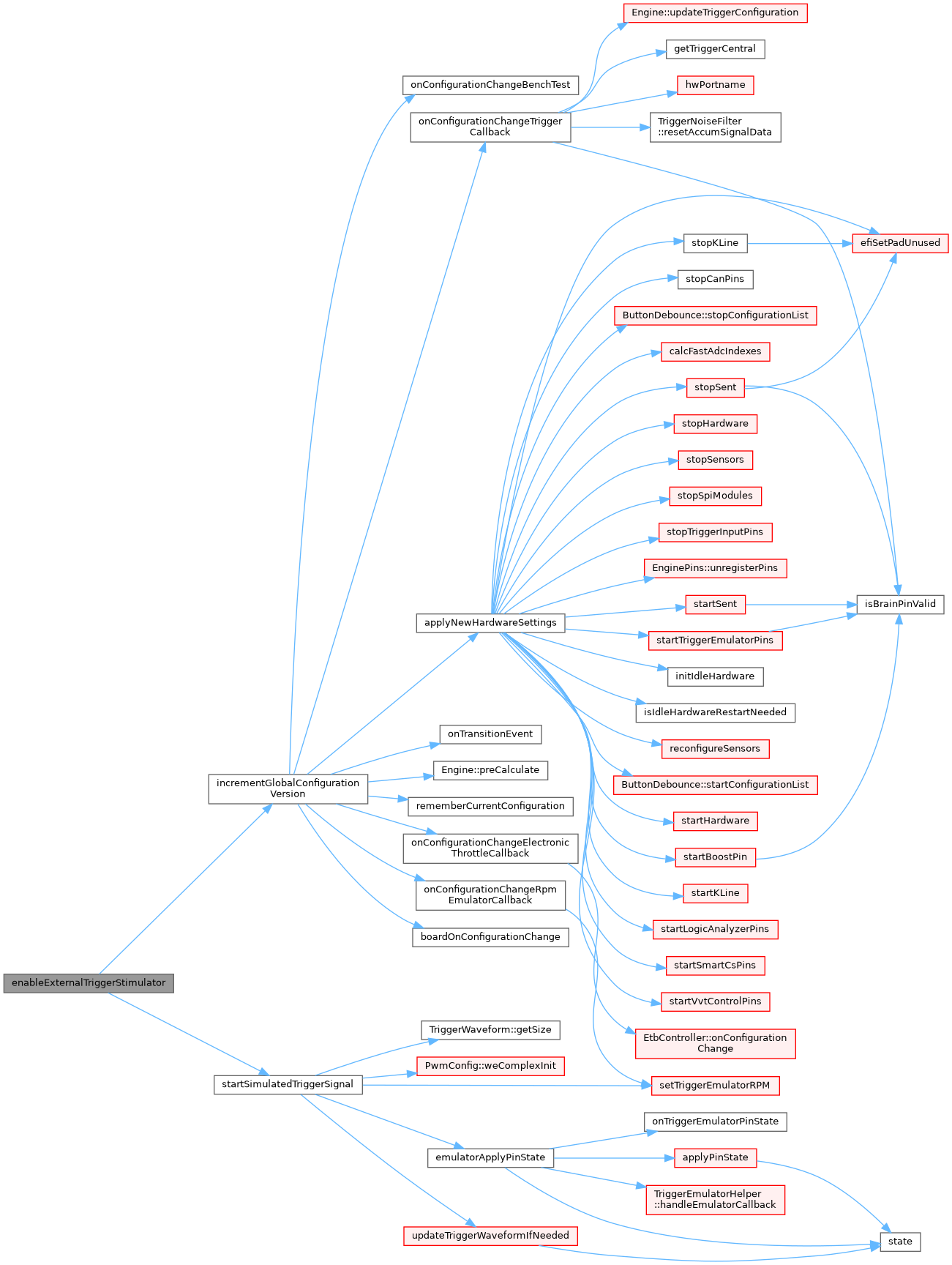
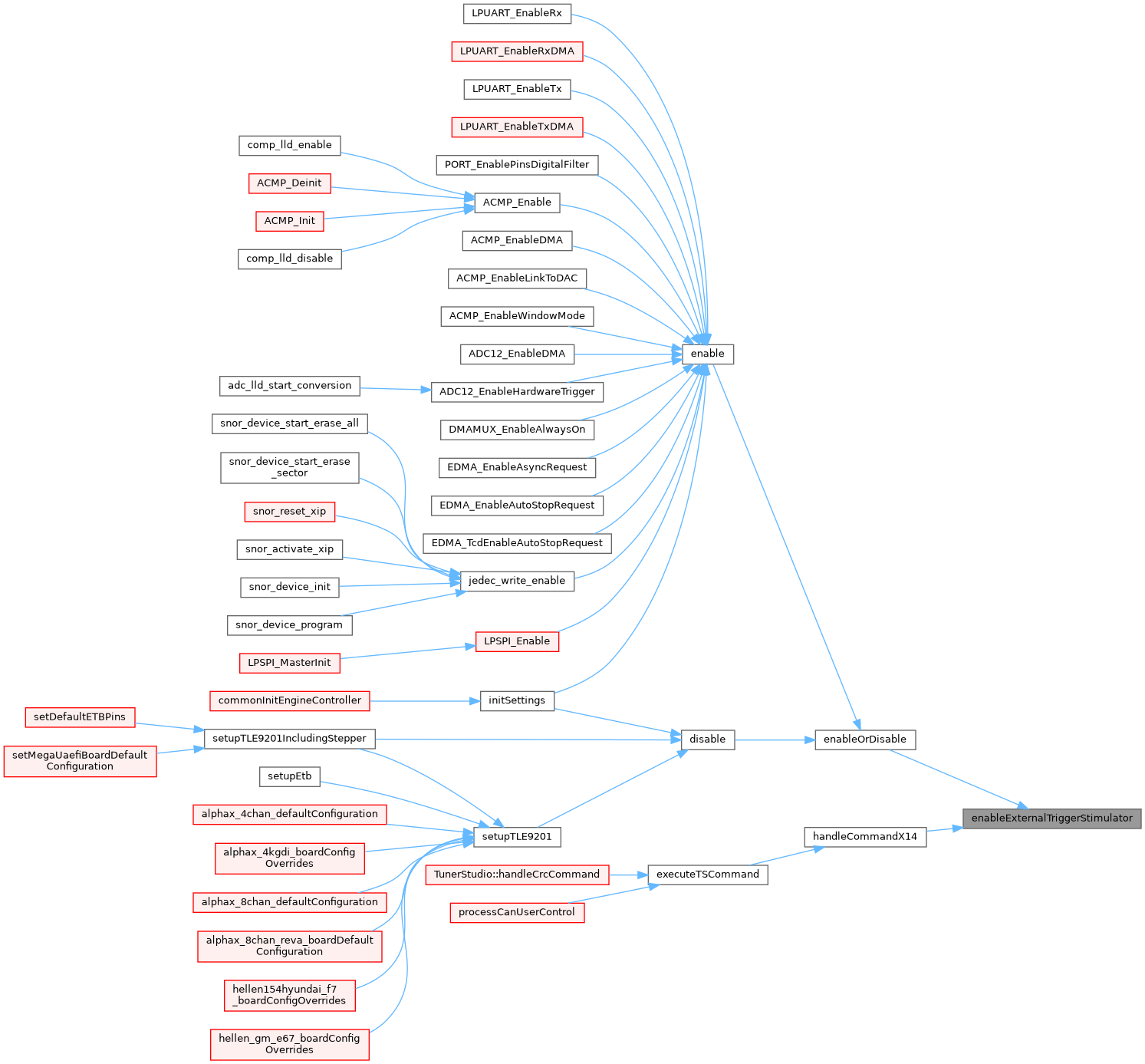
◆ enableTriggerStimulator()
| void enableTriggerStimulator | ( | bool | incGlobalConfiguration | ) |
Definition at line 205 of file trigger_emulator_algo.cpp.
Referenced by configureRusefiLuaHooks(), enableOrDisable(), and handleCommandX14().


◆ fail()
| fail | ( | "EFI_SHAFT_POSITION_INPUT required to have EFI_EMULATE_POSITION_SENSORS" | ) |
this instance does not have a real physical pin - it's only used for engine sniffer
todo: we can kind of add real physical pin just for a very narrow case of troubleshooting but only if we ever need it :)
Engine idles around 20Hz and revs up to 140Hz, at 60/2 and 8 cylinders we have about 20Khz events If we can read buffer at 50Hz we want buffer to be about 400 elements.
Definition at line 34 of file trigger_emulator_algo.cpp.
◆ getPreviousIndex()
| int getPreviousIndex | ( | const int | currentIndex, |
| const int | size | ||
| ) |
Definition at line 19 of file trigger_emulator_algo.cpp.
Referenced by TriggerStimulatorHelper::feedSimulatedEvent(), and needEvent().

◆ getRpmMultiplier()
|
static |
todo: why is this method NOT reciprocal to getCrankDivider?! todo: oh this method has only one usage? there must me another very similar method!
Definition at line 78 of file trigger_emulator_algo.cpp.
Referenced by setTriggerEmulatorRPM().


◆ initTriggerEmulator()
| void initTriggerEmulator | ( | ) |
Definition at line 239 of file trigger_emulator_algo.cpp.
Referenced by initEngineEmulator().


◆ needEvent()
| bool needEvent | ( | const int | currentIndex, |
| const MultiChannelStateSequence & | mcss, | ||
| int | channelIndex | ||
| ) |
Definition at line 23 of file trigger_emulator_algo.cpp.
Referenced by TriggerStimulatorHelper::feedSimulatedEvent(), and TriggerEmulatorHelper::handleEmulatorCallback().

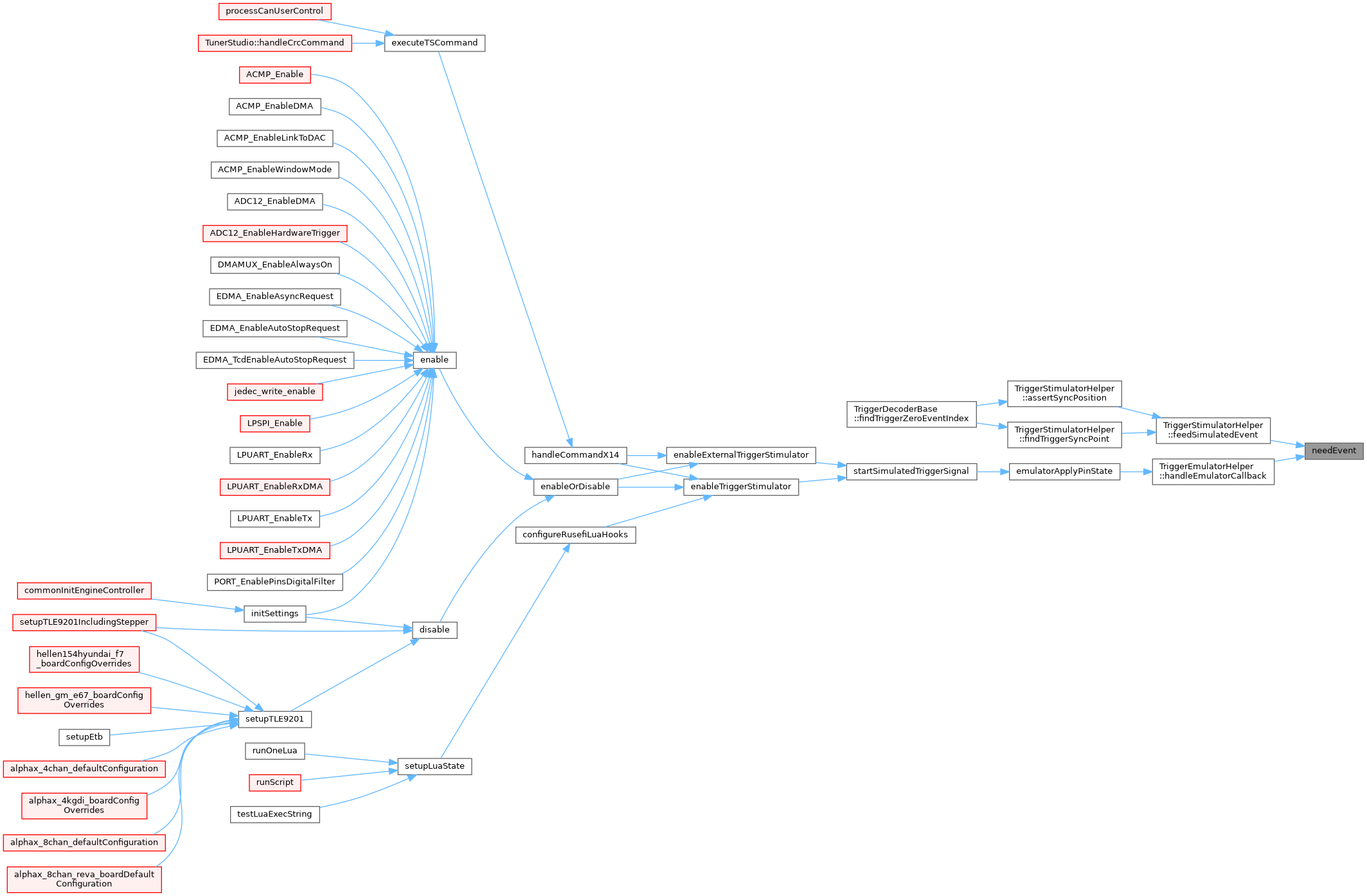
◆ onConfigurationChangeRpmEmulatorCallback()
| void onConfigurationChangeRpmEmulatorCallback | ( | engine_configuration_s * | previousConfiguration | ) |
Definition at line 231 of file trigger_emulator_algo.cpp.
Referenced by incrementGlobalConfigurationVersion().

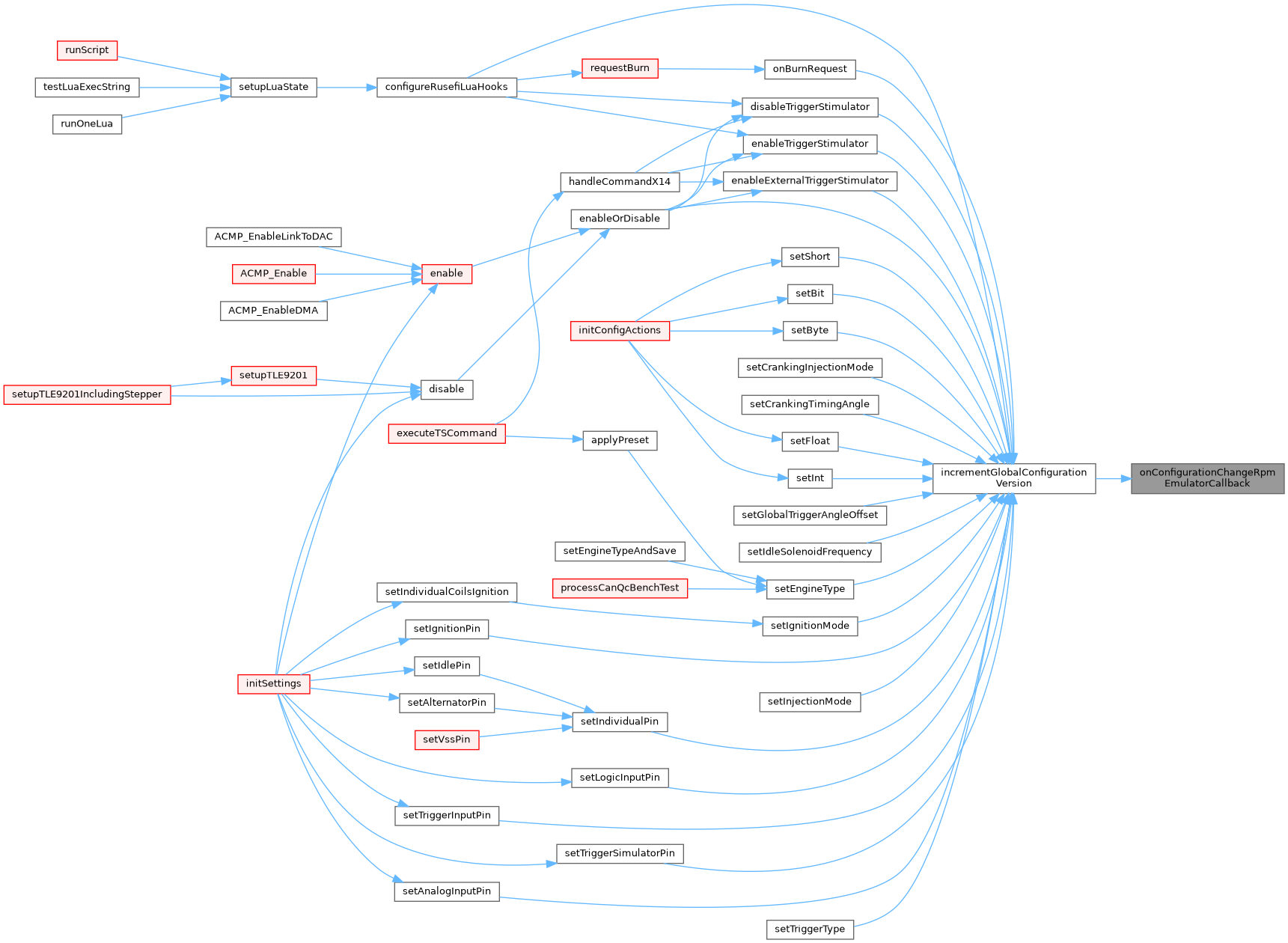
◆ onTriggerEmulatorPinState()
| PUBLIC_API_WEAK void onTriggerEmulatorPinState | ( | int | , |
| int | |||
| ) |
Definition at line 142 of file trigger_emulator_algo.cpp.
Referenced by emulatorApplyPinState().
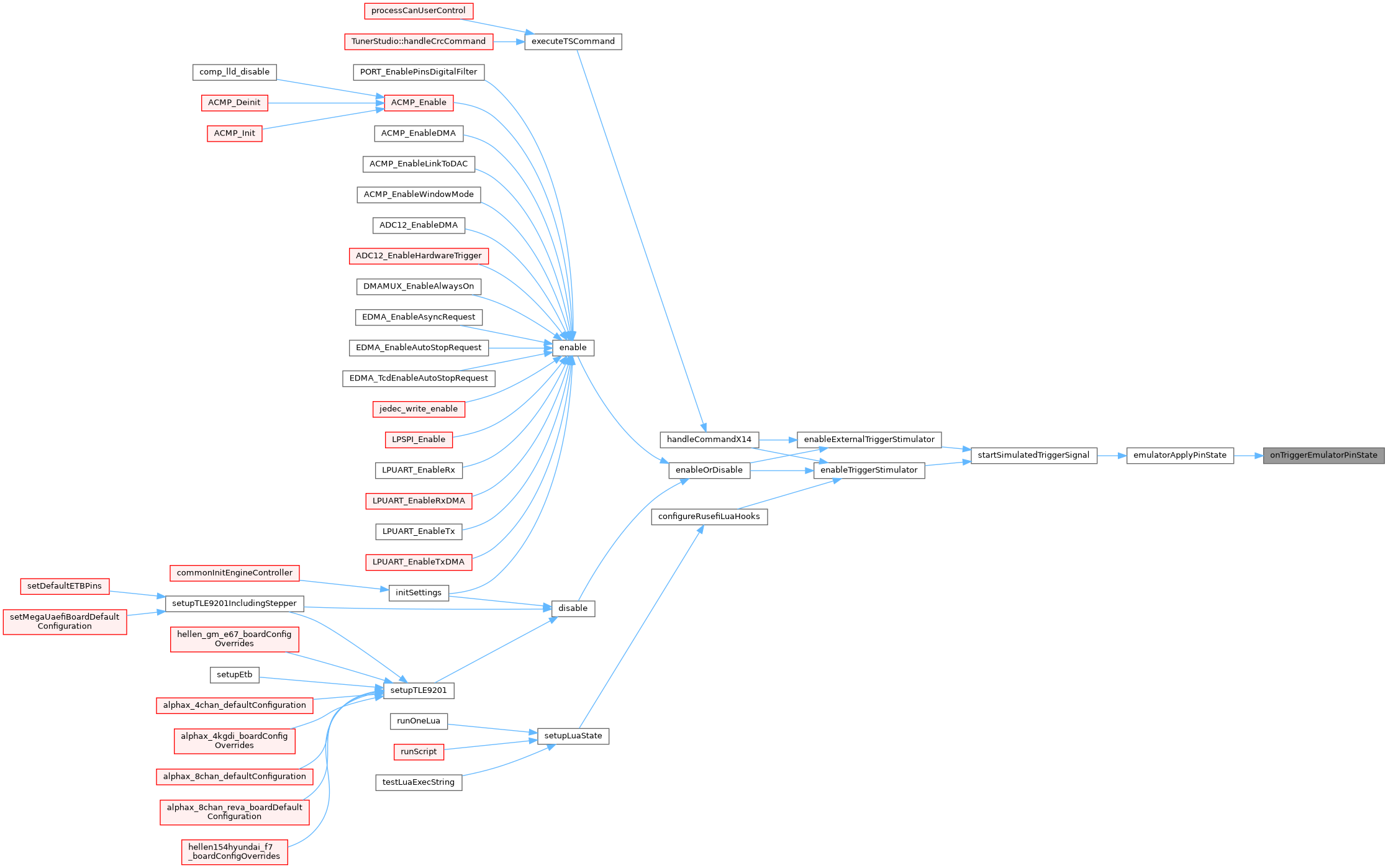
◆ setTriggerEmulatorRPM()
| void setTriggerEmulatorRPM | ( | int | rpm | ) |
All we need to do here is to change the periodMs togglePwmState() would see that the periodMs has changed and act accordingly
Definition at line 97 of file trigger_emulator_algo.cpp.
Referenced by configureRusefiLuaHooks(), initTriggerEmulator(), onConfigurationChangeRpmEmulatorCallback(), setValue(), and startSimulatedTriggerSignal().

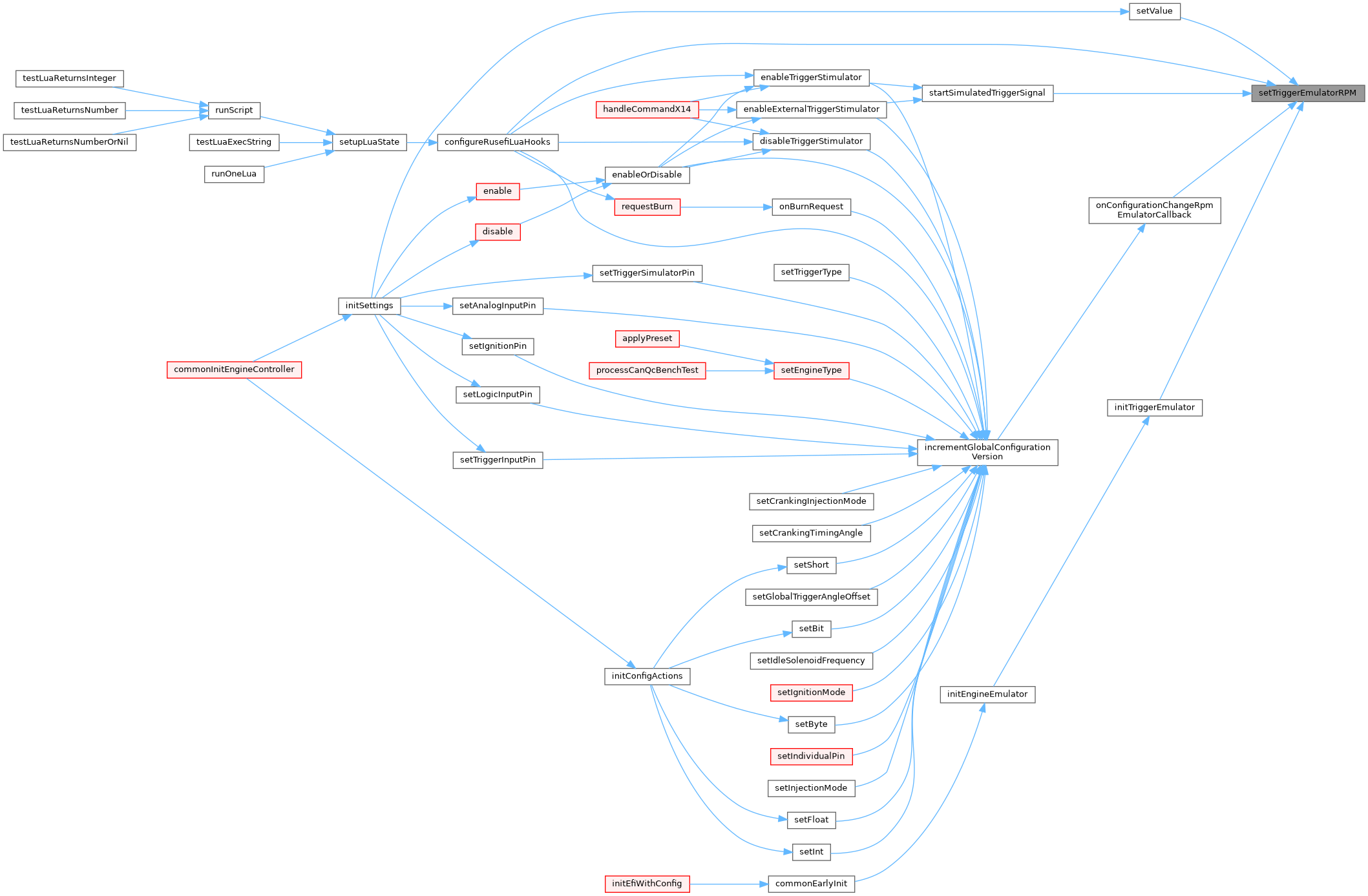
◆ startSimulatedTriggerSignal()
|
static |
Definition at line 177 of file trigger_emulator_algo.cpp.
Referenced by enableExternalTriggerStimulator(), and enableTriggerStimulator().
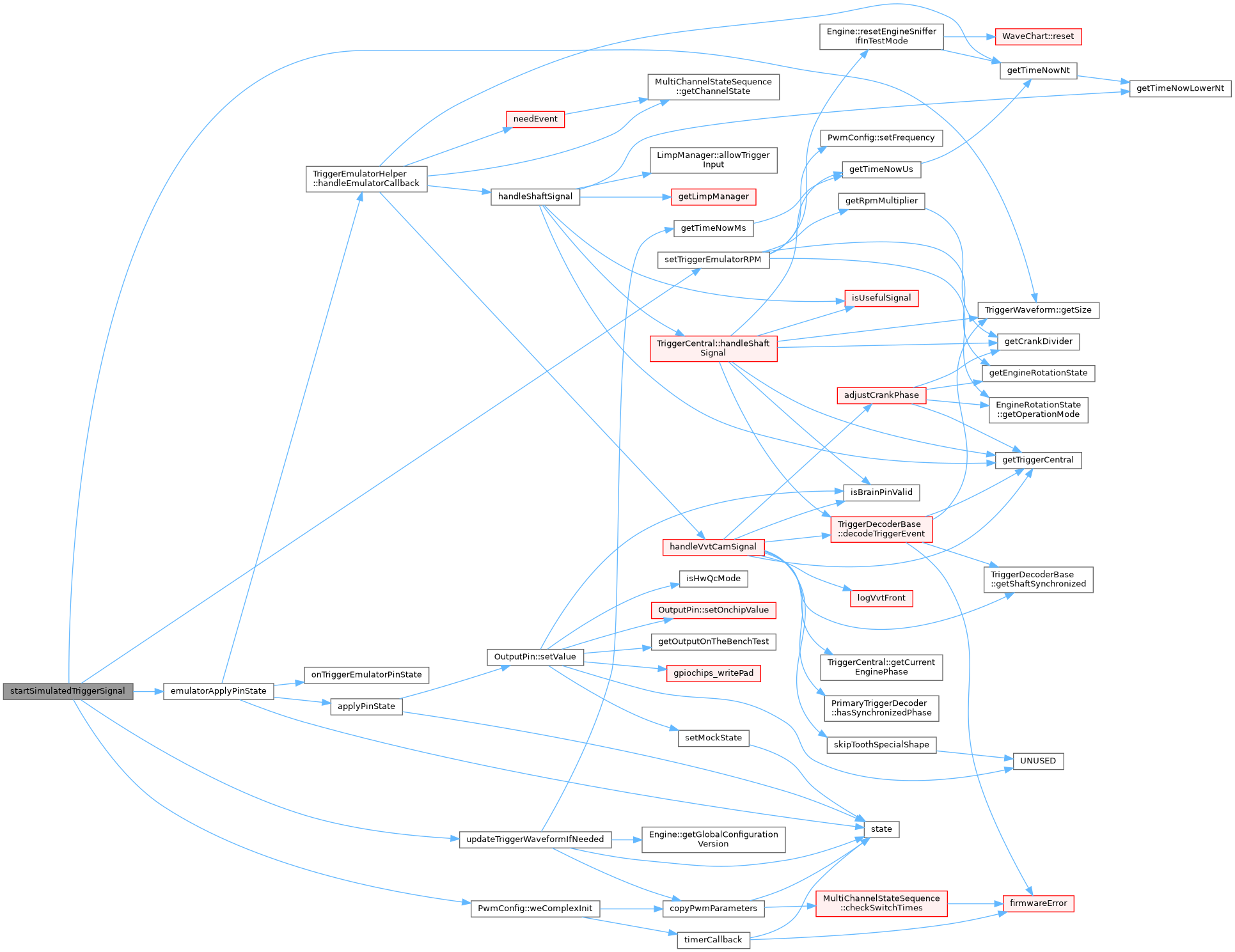
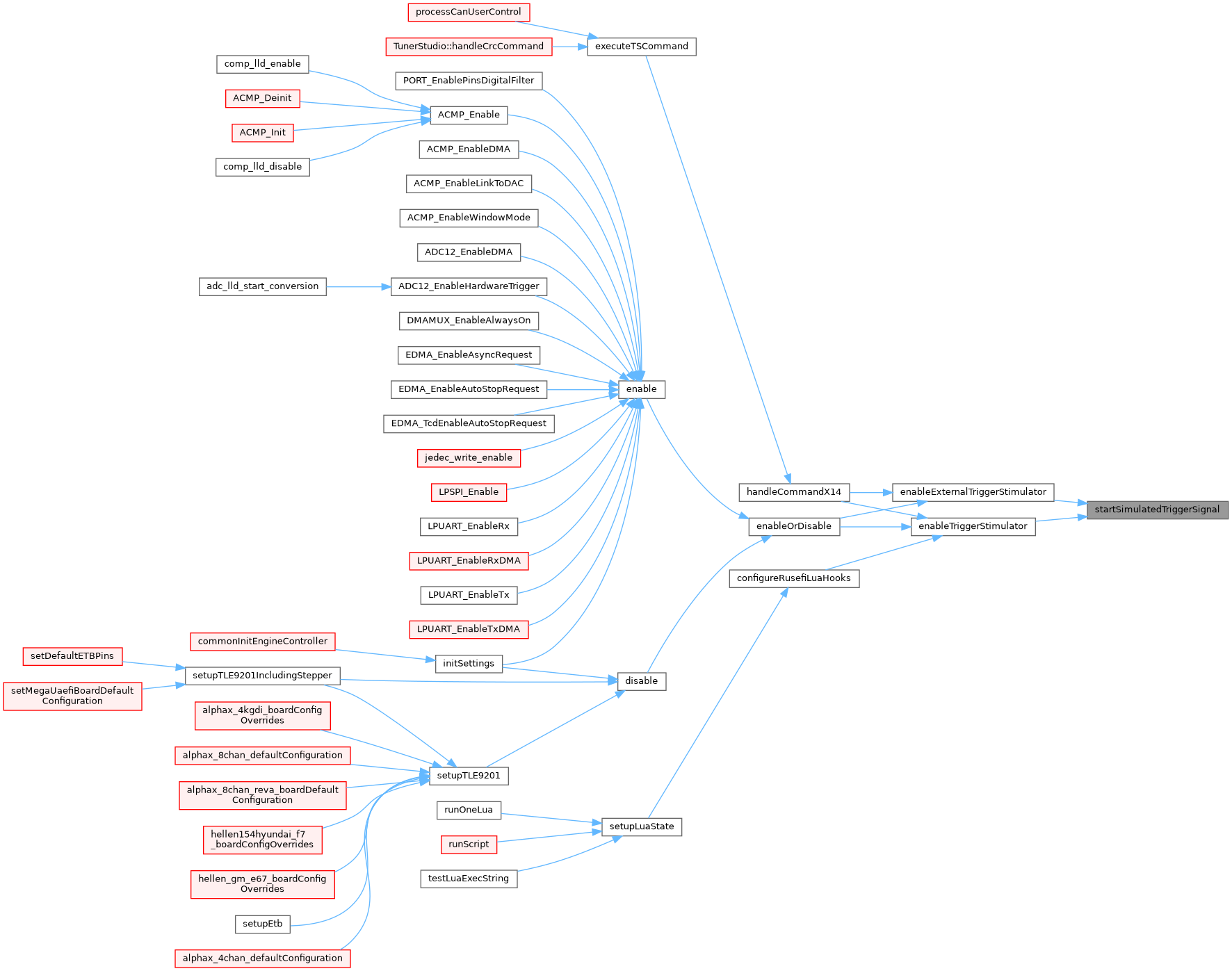
◆ startTriggerEmulatorPins()
| void startTriggerEmulatorPins | ( | ) |
Definition at line 247 of file trigger_emulator_algo.cpp.
Referenced by applyNewHardwareSettings(), and initTriggerEmulator().

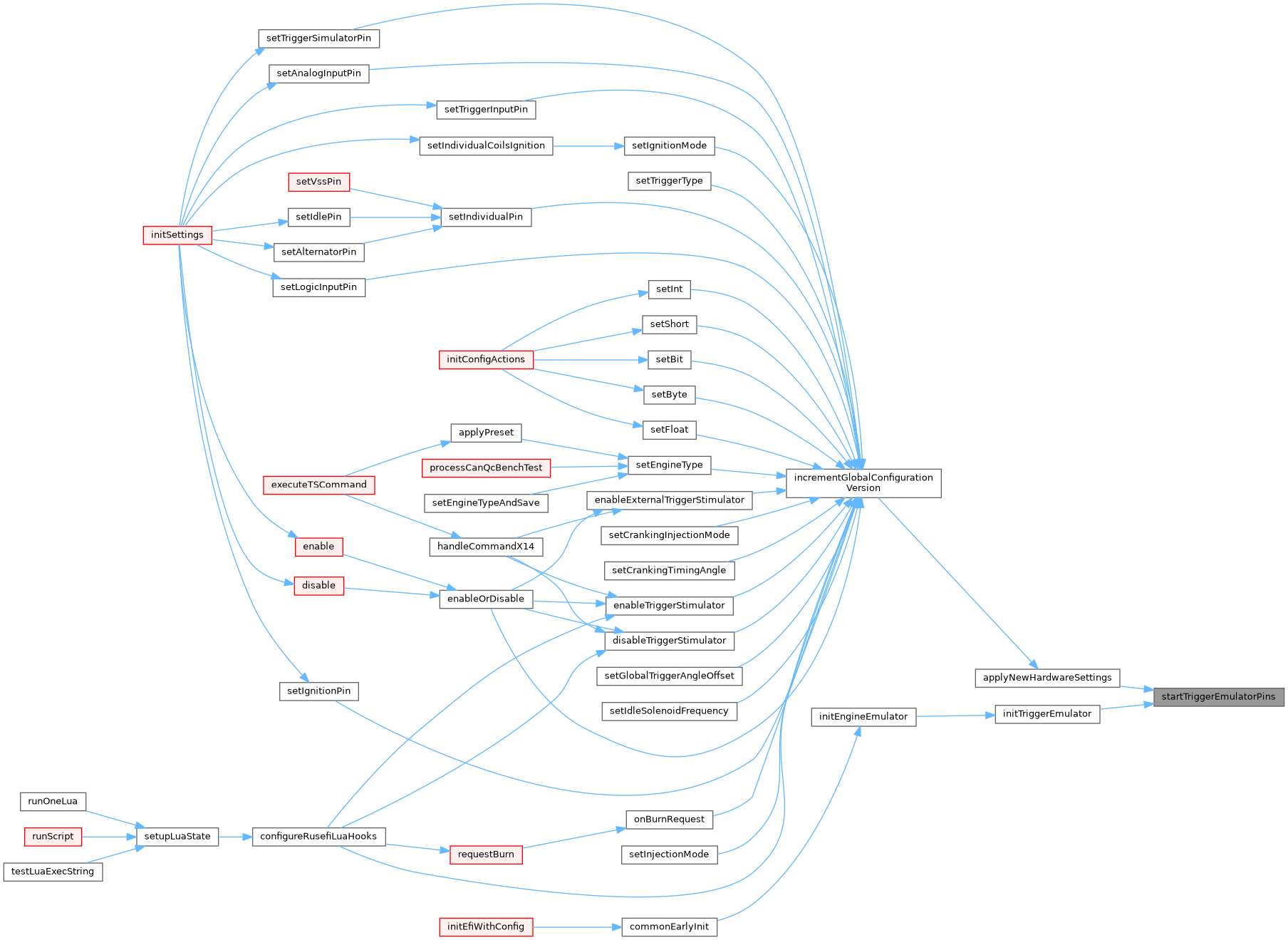
◆ stopTriggerEmulatorPins()
| void stopTriggerEmulatorPins | ( | ) |
Definition at line 282 of file trigger_emulator_algo.cpp.
Referenced by stopHardware().

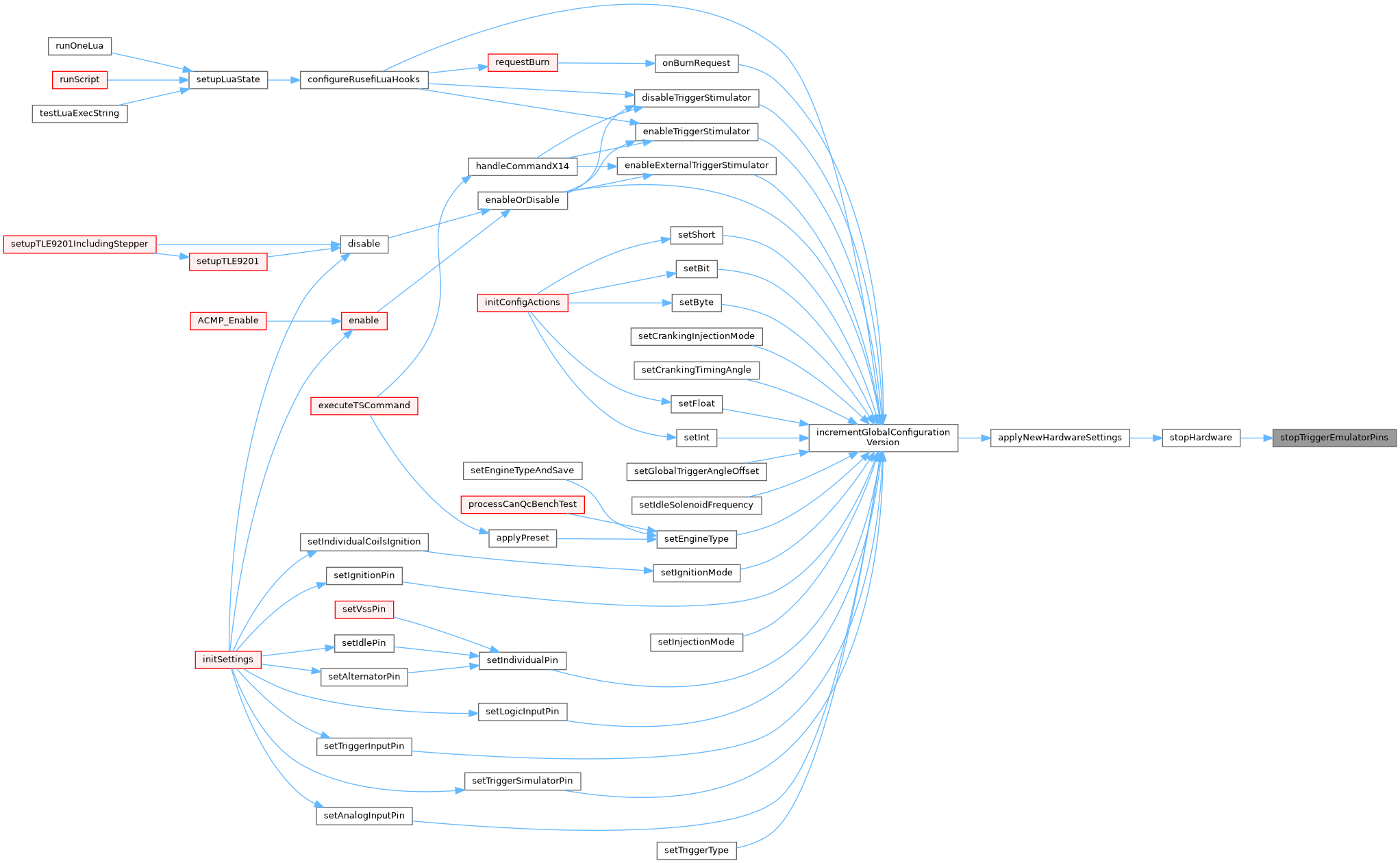
◆ updateTriggerWaveformIfNeeded()
|
static |
Definition at line 120 of file trigger_emulator_algo.cpp.
Referenced by startSimulatedTriggerSignal().

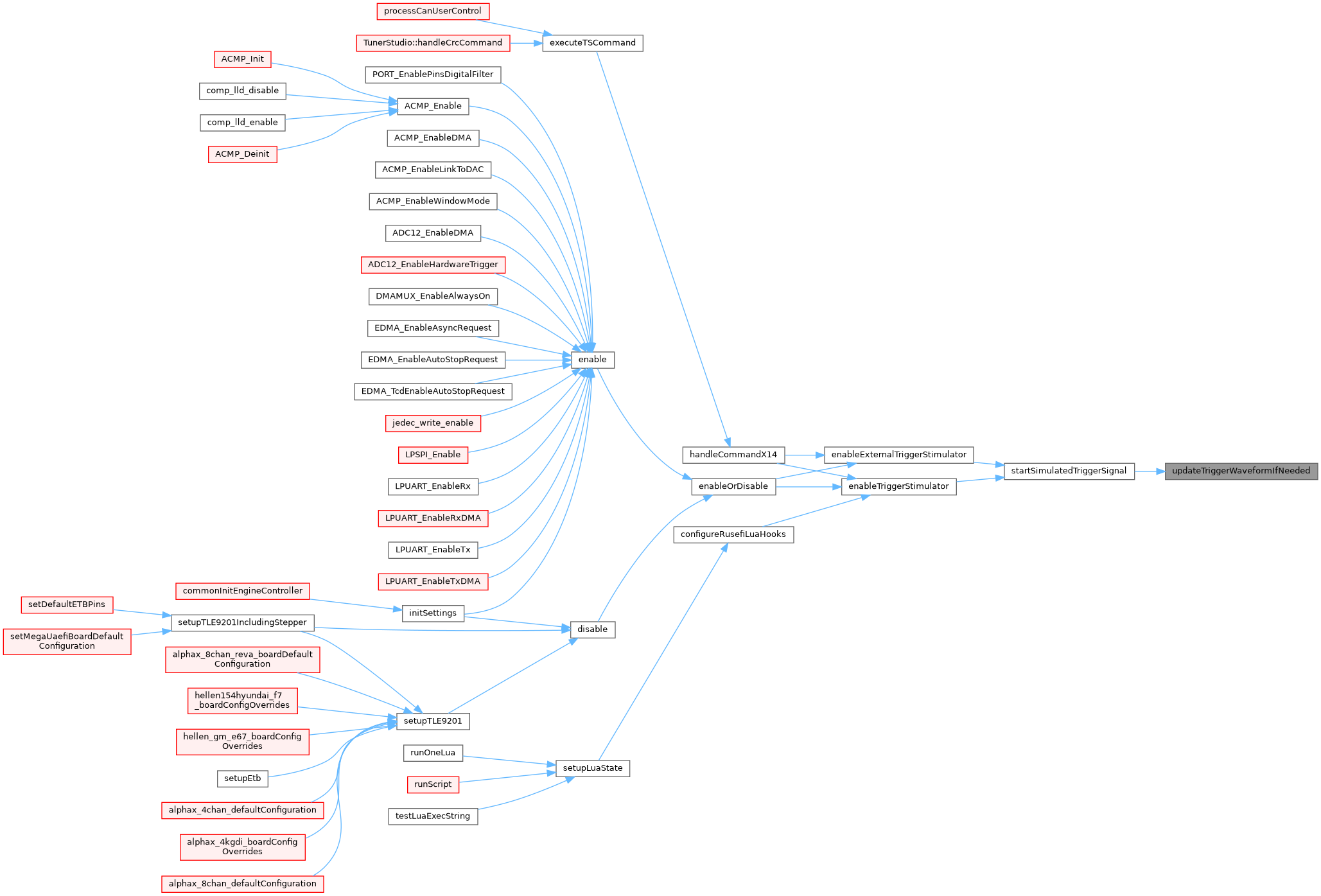
Variable Documentation
◆ atTriggerVersions
|
static |
Definition at line 72 of file trigger_emulator_algo.cpp.
Referenced by updateTriggerWaveformIfNeeded().
◆ emulatorOutputs
|
static |
Definition at line 44 of file trigger_emulator_algo.cpp.
Referenced by startTriggerEmulatorPins(), and stopTriggerEmulatorPins().
◆ hasInitTriggerEmulator
|
static |
Definition at line 139 of file trigger_emulator_algo.cpp.
Referenced by disableTriggerStimulator(), and startSimulatedTriggerSignal().
◆ hasStimPins
|
static |
Definition at line 137 of file trigger_emulator_algo.cpp.
Referenced by emulatorApplyPinState(), and startTriggerEmulatorPins().
◆ helper
|
static |
Definition at line 136 of file trigger_emulator_algo.cpp.
Referenced by emulatorApplyPinState().
◆ triggerEmulatorSignals
| PwmConfig triggerEmulatorSignals[NUM_EMULATOR_CHANNELS] |
Definition at line 69 of file trigger_emulator_algo.cpp.
Referenced by disableTriggerStimulator(), emulatorApplyPinState(), setTriggerEmulatorRPM(), startSimulatedTriggerSignal(), startTriggerEmulatorPins(), stopTriggerEmulatorPins(), triggerInfo(), and updateTriggerWaveformIfNeeded().
◆ triggerEmulatorWaveforms
| TriggerWaveform* triggerEmulatorWaveforms[NUM_EMULATOR_CHANNELS] |
Definition at line 70 of file trigger_emulator_algo.cpp.
Referenced by startSimulatedTriggerSignal(), and updateTriggerWaveformIfNeeded().